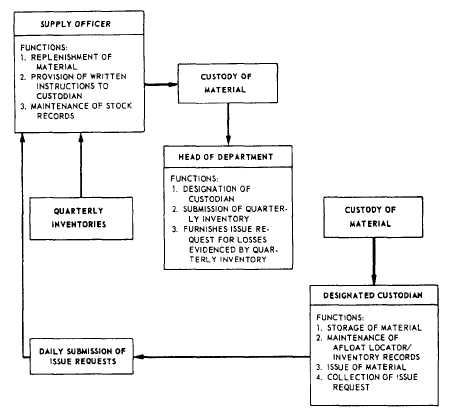Shore activities usually have a material
inspection section within the material division,
established to perform or coordinate such
inspections. When technical material is received,
the material inspection section will often
request that a qualified representative from a
using department perform the quality inspection.
You will be called on frequently to perform this
service.
Most material received aboard ships comes
from naval activities ashore that have already
performed a quality inspection. You should
inspect the item for any obvious deterioration or
breakage that may have occurred since the
previous quality inspection.
Technical materials or materials ordered for
direct turnover are inspected by the cognizant
department head or authorized representative.
You, as a senior petty officer, may be assigned
this duty. Except in emergencies, when the
commanding officer may waive minor defects, no
purchased material should be accepted unless it
conforms to the specifications included in the
purchase document.
After the purchased material has been turned
over to you, the supply department presents a
copy of the purchase document or the dealer’s
invoice stamped
“Received, inspected, and
accepted.” This certification is then signed by the
department head and the document returned to
the supply department.
STOWAGE AND CUSTODY
When repair parts and consumables are stowed
in spaces other than supply spaces, the head
of the department having actual custody is
responsible for the proper stowage, inventory,
and use of the material. (Figure 4-4 illustrates
the functions involved and the usual flow
of responsibilities.) The supply officer has
technical custody and maintains stock records
and requisitions replenishment stock. The supply
officer also provides written instructions to the
custodian, who is usually a senior petty officer.
A custodian is appointed by the responsible
department head and designated in writing to the
supply officer.
Figure 4-4.-Flow of responsibility relating to materials stored in other than supply spaces.
4-14


